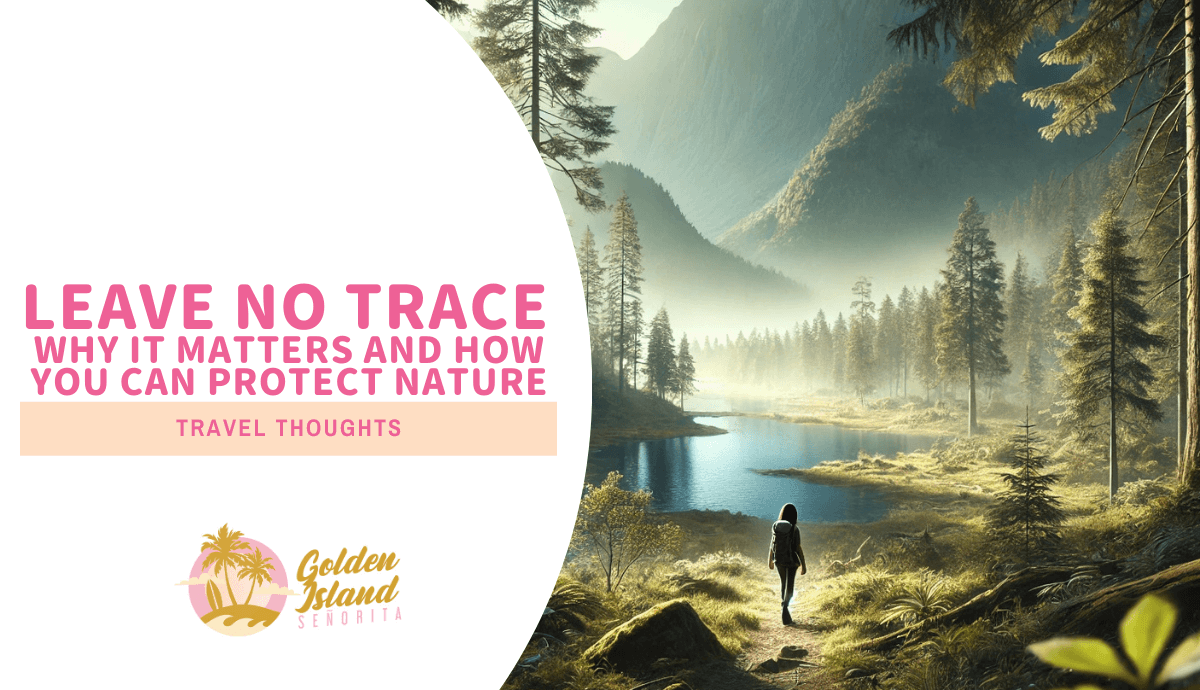Exploring the great outdoors is one of life’s greatest pleasures. Whether you’re hiking up a majestic mountain, camping in a lush forest, or simply having a picnic in a nearby park, nature provides us with a breathtaking escape from the chaos of daily life. However, with the increasing number of outdoor enthusiasts, it’s crucial that we take responsibility for preserving the environment. This is where the Leave No Trace principle comes into play.
Leave No Trace is more than just a saying; it’s a philosophy, a set of guidelines, and a movement that ensures we protect and preserve nature for future generations. But why is Leave No Trace so important, and how can you make a difference? Let’s dive into the significance of Leave No Trace and explore the simple yet impactful ways you can help keep nature pristine.
Understanding the “Leave No Trace” Principle
The Leave No Trace (or LNT) principle is a set of seven guidelines designed to minimize human impact on the environment. These principles are not strict rules but rather recommendations that help outdoor enthusiasts respect and care for nature.
- Plan Ahead and Prepare
- Travel and Camp on Durable Surfaces
- Dispose of Waste Properly
- Leave What You Find
- Minimize Campfire Impact
- Respect Wildlife
- Be Considerate of Other Visitors
By following these principles, we can ensure that our outdoor activities don’t cause long-term damage to the environment. Now, let’s break them down and see how you can implement LNT in your adventures.
1. Plan Ahead and Prepare
Proper planning is key to reducing environmental impact. Before heading out, research the area you’re visiting and familiarize yourself with any regulations in place. Packing essential gear, checking weather conditions, and understanding terrain challenges can prevent unnecessary harm to nature. Remember, being prepared means fewer emergencies and fewer chances of disrupting the ecosystem.
2. Travel and Camp on Durable Surfaces
One of the fundamental principles of Leave No Trace is staying on designated trails and campsites. Straying off paths can lead to soil erosion and damage fragile plant life. When setting up camp, choose durable surfaces like rock, gravel, or established campsites instead of delicate vegetation. This simple action helps preserve the land for future adventurers.
3. Dispose of Waste Properly
If there’s one thing that defines Leave No Trace, it’s the practice of packing out what you bring in. Always carry a trash bag to collect your waste, and don’t leave food scraps behind. If you need to use the bathroom outdoors, follow proper guidelines by digging a small hole at least 200 feet from water sources and burying human waste properly. Keeping nature clean is a shared responsibility.
4. Leave What You Find
Nature is filled with wonders—beautiful flowers, unique rocks, and fascinating artifacts. While it’s tempting to take souvenirs, doing so disrupts the environment. The Leave No Trace principle encourages us to appreciate nature without altering it. Instead of collecting, take photographs and leave the beauty for others to enjoy.
5. Minimize Campfire Impact
Campfires can be both magical and destructive. Always check if campfires are allowed in your area, and if so, use established fire rings. Keep fires small, burn only small sticks, and ensure the fire is completely extinguished before leaving. Better yet, opt for a camp stove to cook meals without leaving behind scorched earth.
6. Respect Wildlife
Observing animals in their natural habitat is an incredible experience, but getting too close can be harmful. Avoid feeding wildlife, as human food can be dangerous for them. Keep a safe distance, store food properly, and remember that you’re a visitor in their home. Leave No Trace means respecting all living creatures.
7. Be Considerate of Other Visitors
Nature is for everyone to enjoy, so be mindful of others. Keep noise levels down, yield to other hikers on the trail, and give fellow adventurers space to appreciate their surroundings. A key aspect of Leave No Trace is ensuring everyone has a peaceful and enjoyable experience in the great outdoors.
Why “Leave No Trace” Matters More Than Ever
With more people venturing into nature, the impact on the environment is greater than ever. Litter, damaged trails, and polluted water sources are becoming more common, threatening the very beauty we seek to enjoy. Leave No Trace is essential in preserving natural areas, preventing irreversible damage, and ensuring that future generations can experience the same breathtaking landscapes we do today.
How You Can Help Spread the Leave No Trace Message
Beyond practicing Leave No Trace, you can inspire others to do the same. Here’s how:
- Lead by example – Show others how to respect nature by following Leave No Trace principles.
- Educate friends and family – Share the importance of Leave No Trace with those around you.
- Volunteer for clean-up efforts – Join or organize clean-up hikes to remove litter from parks and trails.
- Support conservation organizations – Donate or volunteer with groups that promote Leave No Trace.
- Use social media wisely – Promote responsible outdoor ethics by sharing Leave No Trace tips online.
Final Thoughts
The Leave No Trace principle is a commitment to protecting nature. By following these simple guidelines, we can ensure that our favorite outdoor spots remain beautiful and thriving for generations to come. So the next time you embark on an adventure, remember: Leave No Trace isn’t just a rule—it’s a responsibility and a gift to nature.
Let’s work together to keep our planet pristine. Embrace Leave No Trace, inspire others, and be the change the environment needs.


I love this so much! Sometimes people are not respectful to others who are visiting places when they are and it stinks!
I work at an NGO and totally agree with everything that you just said. Hills have this problem because trash doesn’t decompose. People need to learn and work on better ways to reduce the problem.
I have seen people leaving trash behind making the place worse! Especially in beaches! This is such a great post!